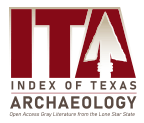Home > Research Projects and Centers > Center for Regional Heritage Research > Index of Texas Archaeology > Vol.
Article Title
Agency
Texas Historical Commission
Abstract
In December, 2013, and January, 2014, South Texas Archeological Research Services, LLC, conducted a cultural resources survey for the Bell County Water Control and Improvements District No. 3 Lift Station Project in Nolanville, Bell County, Texas. The survey focused on discovery, identification, and preliminary assessment of archeological resources. The area surveyed was about 250 m of utilities line right-of-way about 30 m wide and a circular lift station site about 40 m in diameter. It consisted of about two acres of land.
Because the survey area was owned or controlled by a political subdivision of the State of Texas, compliance with the Antiquities Code of Texas was triggered for the project. Since there was no federal link for the project, the National Historic Preservation Act did not apply to it. The survey included search of relevant data in the Texas Historical Commission’s Texas Archeological Sites Atlas, pedestrian visual surface inspection, subsurface testing, and reporting. It was done under Texas Antiquities Permit 6736 and according to applicable professional standards and guidelines.
Surface inspection and subsurface testing during fieldwork revealed that much of the project area was previously disturbed in recent times by human agency, and apparently was also disturbed by natural forces such as soil erosion, deflation, and flooding. No archeological evidence was found and no non-archeological cultural evidence that might have been eligible for landmark designation or that merited further investigation or documentation was seen either within or adjacent to the project area. Nothing was collected or curated.
Considering the methods and results of the survey, the Principal Investigator believed that the project as planned at the time of the survey should not affect any cultural resources eligible for landmark designation and therefore should proceed without further state antiquities code compliance efforts. It was also recommended that, per applicable statutes and regulations, if any archeological evidence was discovered during construction all work in the vicinity should immediately be suspended pending examination of the finds by the Texas Historical Commission and/or a Commission-qualified archeological consultant.
Creative Commons License

This work is licensed under a Creative Commons Attribution-NonCommercial 4.0 International License
Included in
American Material Culture Commons, Archaeological Anthropology Commons, Environmental Studies Commons, Other American Studies Commons, Other Arts and Humanities Commons, Other History of Art, Architecture, and Archaeology Commons, United States History Commons
Submission Location
Tell us how this article helped you.


